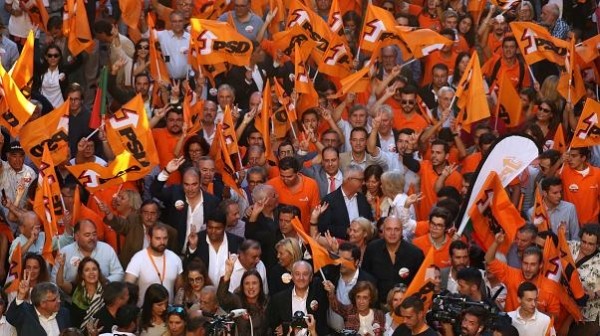
A rally of the Portuguese Social Democrats in Lisbon
– Copyright REUTERS
More than 20 political movements will be in the running as voters head to the polls for parliamentary elections in Portugal on Sunday (October 6).
But who are the main parties and what do they stand for? Euronews has taken a look, below.
Last time out, in 2015, the right-wing coalition (“Portugal Ahead, a coalition between the Social Democratic Party and the People’s Party) won the most votes, but it was toppled after 11 days by the anti-austerity Socialist leader António Costa, who governed in an alliance with other left-wing parties (the Left Bloc, the Communist Party, and the Greens).
Polls suggest that on Sunday the Socialists will win the most seats but will fail to secure a parliamentary majority.
Read more: Portugal elections: is it the end of the ‘contraption’ left-wing coalition?
The Portuguese political scene has been dominated by the Socialist Party and the Social Democratic Party since the 1974 Carnation Revolution, although the People’s Party has been present in some governments.
This is how Portugal’s parliament looked after the 2015 general election: Social Democratic Party (89 MPs), the Socialist Party (86 MPs), the People’s Party (18 MPs), the Communist Party (17 MPs), the Left Bloc(19 MPs), and the People-Animals-Nature (1 MPs).
The Social Democratic Party (PSD)

REUTERS/Jon Nazca
Leader: Rui Rio
The name is misleading: the Social Democratic Party is a right-wing party, close to other European centre-right parties such as the British Conservatives, the Spanish PP, or the German CDU. It is the main opposition party and its leader, Rui Rio, is also the leader of the opposition.
It was founded in 1974, soon after the revolution, by figures of the “liberal wing” of the fascist regime such as Francisco Sá Carneiro, Francisco Pinto Balsemão and Joaquim Magalhães Mota.
The Social Democratic Party has previously joined coalitions with electoral purposes, such as the AD – Democratic Alliance (PPD / PSD, CDS and PPM) between 1979 and 1981.
The People’s Party (CDS)
Leader: Assunção Cristas
The People’s Party is a traditional Christian Democrat party, very similar to the German CSU.
It is to the right of the PSD and was also founded after the revolution.
A strong advocate of social and religious conservatism, the People’s Party was the only party that voted against the approval of a socialist constitution in 1976. It went into a more populist right-wing phase in the 1990s and early 2000s and has since returned to its centrist Christian Democrat roots.
It was named “Party of the Social Democratic Center” with the acronym CDS until 1981, when the name “People’s Party” was added.
The Socialists (Partido Socialista, PS)

REUTERS/Rafael Marchante
Leader: Current Prime Minister António Costa, who is seeking re-election.
The PS is a social-democratic party like the British Labour Party, the German SPD or the Spanish PSOE.
It was founded in 1973, before the Revolution, in Bad Münstereifel, West Germany by Mário Soares, one of the main opponents of the fascist regime, and by other personalities, through the transformation of the Portuguese Socialist Action which emerged in 1964.
Socialist Prime Minister José Sócrates (2005-2011) was arrested in Lisbon in 2014 on charges of corruption, tax evasion and money laundering, becoming the first head of government in the history of the country to face such accusations. He went to prison and remains under house arrest.
Unitarian Democratic Coalition (CDU)
Leader: Jerónimo de Sousa
The Unitarian Democratic Coalition (CDU) is an electoral and political coalition between the Portuguese Communist Party (Partido Comunista Português or PCP) and the Ecologist Party “The Greens”(Partido Ecologista “Os Verdes” or PEV).
The Communist Party
The Portuguese Communist Party is a left-wing party founded in 1921 as the Portuguese Section of the Communist International (Comintern). It played a major role in the opposition to the Salazar regime.
The Communist Party still enjoys popularity in vast sectors of Portuguese society, particularly in the rural areas of Alentejo and Ribatejo and also in the heavily industrialized areas around Lisbon and Setúbal.
The Greens (Os Verdes)
Leader: Heloísa Apolónia
Os Verdes is an eco-socialist party and a member of the European Greens.
It has had a close relationship with the Communist Party since its foundation in 1982.
It also edits a newspaper named Folha Verde.
The Left Bloc (Bloco de Esquerda, BE)
Leader: Catarina Martins
The Left Bloc (Bloco de Esquerda, BE) is a left-wing party founded in 1999.
Catarina Martins isn’t exactly the party leader but more of a spokesperson for its six-member Permanent Commission.
The party is made up of several groups that remain separate political associations and retain some level of autonomy.
Other parties
People-Animals-Nature / Leader: André Silva
Aliança / Leader: Pedro Santana Lopes
Chega / Leader: André Ventura
Iniciativa Liberal / Leader: Carlos Guimarães Pinto
Partido Nacional Renovador / Leader: José Pinto-Coelho
Partido Democrático Repúblicano / Leader: Marinho e Pinto
Partido Comunista dos Trabalhadores / Leader: Arnaldo Matos
Portugueses Partido Popular Monárquico / Leader: Paulo Estêvão
Partido Trabalhista Português / Leader: Amândio Madaleno
Livre / Leader: Collective leadership
Reagir Incluir e Reciclar / Leader: Vitorino Silva
Partido da Terra / Leader: José Inácio Faria
Partido Unido dos Reformados e Pensionistas / Leader: António Mateus Dias & Fernando Loureiro
NÓS, Cidadãos! / Leader: Mendo Castro Henriques
Movimento Alternativa Socialista / Leader: Gil Garcia
Juntos pelo Povo / Leader: Élvio Sousa
